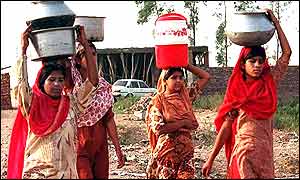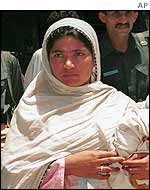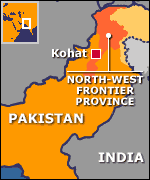|
|
|









PAKISTAN: Has the Suffering of Pakistani Women Touched the
General's Heart?
By Mrs. Nuzhat Ara
Email lotustrust@hotmail.com
lotustrust@yahoo.com
www.lswti.itgo.com
Ed. Note: This article is adapted from a 1999
press release by Human Rights Watch and an article in the South China Morning
Post of June 2, 2000. The full report referred to below is online at
www.hrw.org/reports/1999/pakistan.]
In October 1999, Human Rights Watch released a major report on the state of
women's rights in Pakistan. The 100-page report, ‘Crime or Custom? Violence
Against Women in Pakistan', documents a virtual epidemic of violent crimes
against women, including domestic violence rates as high as 90 percent, at least
eight reported rapes every 24 hours nationwide, and an alarming rise in
so-called honor killings.
"As the world focuses on Pakistan's dramatic political crisis, fifty
percent of the population remains caught in a different kind of crisis,"
said Samya Burney, author of the report and researcher for the women's rights
division of Human Rights Watch. "Women in Pakistan face spiraling rates of
gender-based violence, a legal framework that is deeply biased against women,
and a law enforcement system that retraumatizes female victims instead of
facilitating justice," she added.
Violence against women has risen to staggering levels. Women's low social status
and long-established active suppression of women's rights by successive
governments has contributed to the escalation in violence. No government has
acknowledged the scale and severity of the problem, much less taken action to
end violence against women.
According to the report, domestic violence victims have virtually no access to
judicial protection and redress. Officials at all levels of the criminal justice
system do not consider domestic violence a matter for the criminal courts.
Domestic violence is routinely dismissed by law enforcement authorities as a
private dispute and female victims who attempt to register a police complaint of
spousal or familial physical abuse are invariably turned away. Worse, they are
regularly advised and sometimes pressured by the police to reconcile with their
abusive spouses or relatives.
Women who report rape or sexual assault by strangers fare marginally better than
victims of domestic violence. Persistent and determined victims sometimes
succeed in registering complaints. However women alleging rape are often
disbelieved and treated with disrespect, indeed harassed outright, by officials
at all levels. The institutionalized gender-bias that pervades the criminal
justice system means they must contend with abusive police; forensic doctors
focusing on the status of their virginity rather than their injuries; untrained
prosecutors; skeptical judges, and a discriminatory and deficient legal
framework. "Only the most resilient and resourceful complainants can
maneuver such hostile terrain," said Burney, "And those who do seldom
see their attackers punished."
But when a Commission of Inquiry for women convened by the Pakistan Senate
described domestic violence as one of the country's most pervasive violations of
human rights, the Sharif government brushed aside its findings. As a result of
such dismissive official attitudes, crimes of violence against women continue to
be perpetrated with near total impunity.
Instead of engaging in constructive dialogue, the government of Prime Minister
Nawaz Sharif had actively harassed and attempted to silence women's rights
activists. Women's rights advocacy organizations have increasingly been
subjected to a range of intimidating tactics, including stepped up government
surveillance and threats that their organizations will be banned.
"If the new leadership is genuinely interested in legal and institutional
reform, then violence against women is an issue it cannot afford to
ignore," said Burney. "The problem of violence against women must be
urgently and systematically tackled by whatever government comes to power in
Pakistan."
Human Rights Watch called for the explicit criminalization of all forms of
domestic and familial violence against women and the establishment of clear
guidelines for police intervention and protection in such cases. It urged the
repeal of Pakistan's rape law, the Offence of Zina Ordinance, which allows
marital rape, does not establish the crime of statutory rape, and in some cases
does not permit the female victim to testify. The report also urged Pakistani
authorities ensure that law enforcement personnel are trained to eliminate
biases against women.
Sadly, the period since has seen rising violence against women in Pakistan. The
Human Rights Commission of Pakistan claims that more than 1000 "honour
killings" take place in Pakistan each year. Recent media reports described
how 6 women were brutally murdered during one day in central Punjab province,
all in the name of "honour":
one man hacked his mother-in-law to death over her alleged sexual liaison with a
neighbour;
a woman was killed by four men for her "immodesty";
a youth strangled his own sister on seeing her with an alleged lover;
a man killed his sister over an alleged extra-marital relationship; and,
another stabbed his wife and mother to death.
According to the same sources, Pakistan's military ruler, General Pervez
Musharraf, last month vowed tough action to curb the widespread problem of
honour killings by close relatives of the victims. At a national convention on
human rights he is said to have observed that "killimg in the name of
honour is a murder and will be treated as such" and further, such actions
"do not find any place in our religion or law". Serious legal and
social will is required for genuine change. What remains to be seen is the
extent to which the suffering of Pakistani women has touched the General's
heart.
Pakistan
stoning sentence overturned

Rights groups say women suffer under Islamic laws
An Islamic court in Pakistan
has acquitted a woman who was sentenced to death by stoning for adultery.
Zafran Bibi was
present in the federal shariah (Islamic) court in the capital, Islamabad, when
the three-judge bench announced its verdict.
 She
was brought specially from prison in the North-West Frontier Province (NWFP) on
the orders of the court, which wanted to hear her side of the story.
Bibi was charged after registering a rape case
She
was brought specially from prison in the North-West Frontier Province (NWFP) on
the orders of the court, which wanted to hear her side of the story.
Bibi was charged after registering a rape case
And after hearing her patiently, it set aside
the conviction and ordered her immediate acquittal.
Rights controversy
The harsh sentence on Zafran Bibi, a village
woman from Kohat district in NWFP, had sparked a bitter controversy in the
country, with human rights groups demanding the repeal of controversial Islamic
laws.
These groups say they clearly discriminate
against women.
Zafran Bibi originally went to the police two
years ago to register a case of rape.
 But
instead, she herself was charged with having an adulterous affair. She gave
birth to a son while her husband was in prison, and a court in the conservative
town of Kohat found her guilty of adultery.
But
instead, she herself was charged with having an adulterous affair. She gave
birth to a son while her husband was in prison, and a court in the conservative
town of Kohat found her guilty of adultery.
Under tFollowing widespread criticism by human
rights groups, President Musharraf gave an assurance that the sentence would not
be carried out.
And after a brief hearing, the country's
highest Islamic court has now overturned the lower court's decision.
he country's Islamic laws, she was sentenced
to death by stoning.
But human rights groups say there are numerous
cases in which victims of rape have been charged with adultery under the
controversial Islamic laws.
They say unless these laws are repealed, their
misuse will continue, and women will
largely be the victims.
 PAKISTANI
WOMAN LIFE
PAKISTANI
WOMAN LIFE
BY.
RANA AFTAB
SECRETARY GENERAL LSWTI